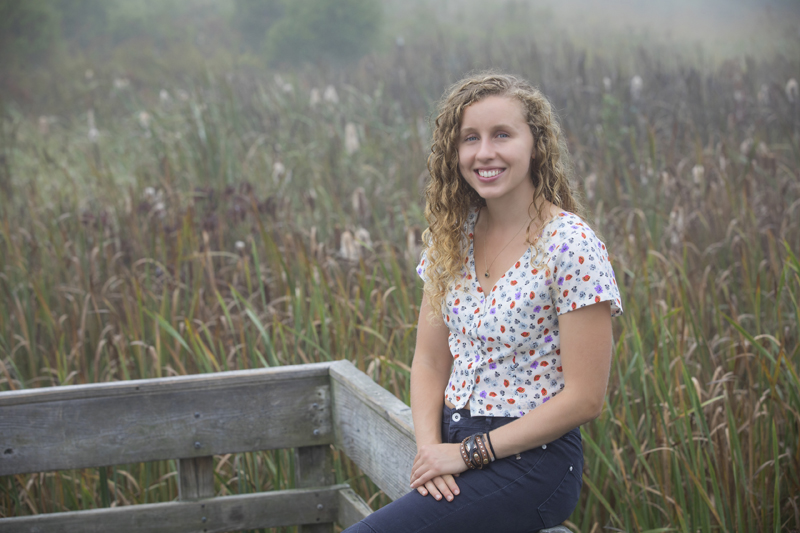2018 graduate receives NSF research fellowship
Michelle Crook to pursue chemistry doctorate at Cal-Berkeley

A late-night flight and an old cellphone kept Michelle Crook in suspense about whether she received a prestigious National Science Foundation graduate research fellowship.
“We didn’t get to Phoenix (for a research conference) until 3 a.m. Eastern time,” she said. “I was exhausted. We landed and I turned the airplane mode off on my phone. I saw an email subject that said ‘GRFP Results.’ I was sitting on the plane, just refreshing my phone. I think it took 10 minutes to learn (the outcome).”
Crook, who graduated in May with a degree in chemistry (emphasis in materials chemistry), got some good news: She is one of 2,000 to receive an award offer from the National Science Foundation (NSF) Graduate Research Fellowship Program. This year’s award recipients were selected from more than 12,000 applicants across the country.
The program recruits high-potential, early-career scientists and engineers and supports their graduate research training in science, technology, engineering and mathematics (STEM) fields. The program also provides three years of financial support within a five-year fellowship period—a $34,000 annual stipend and a $12,000 cost-of-education allowance to the graduate institution.
Crook, a 21-year-old from Corning, N.Y., will use her fellowship at the University of California, Berkeley, where she will begin pursuit of her doctorate this fall in synthetic and organic chemistry.
“I’m done with the Northeast winters for now,” she said with a laugh.
Crook, who chose Cal-Berkeley over UCLA, the University of Washington, the University of Illinois and California Institute of Technology, will start classes in August.
“There are lots of options for me to meet with the faculty there and see what kinds of research they are doing before deciding on the projects I want to focus on,” she said.
The fellowship will allow Crook to be more creative and selective in her research.
“If you don’t have this fellowship, you have to find funding somehow,” she said. “This (award) frees up time for yourself and your professor. You don’t have to worry about where your funding is coming from.
“Even if (faculty members) do not have a project that is aligned with my interests, I could do my own project because I’ll have my own funding.”
At Binghamton University, Crook’s research interests were in improving batteries. She spent three years in Distinguished Professor M. Stanley Whittingham’s lab synthesizing the cathode material for lithium-ion batteries.
Crook also spent two summers taking part in Research Experiences for Undergraduates (REU) programs at Colorado State University and the University of Texas at Dallas. It was at Colorado State that Crook first learned of the NSF fellowship opportunity.
“Not only was I doing research there, but we would have a group lunch once a week and talk about career building and graduate school,” she recalled. “I was getting hands-on research experience and it was helping me with the logistics (of my future).”
Crook, a cross-country and track athlete who received an honorable mention in the 2017 Goldwater Scholarship competition, spent the spring and early fall of 2017 working on her NSF application.
“I was competing against grad students and every other senior,” she said. “I thought I would just do the best I could and then hope and see.”
She praised the feedback she got from Valerie Imbruce, director of the Undergraduate Research Center and Office of External Scholarships, Fellowships and Awards.
“My essays were much better after she read them,” Crook said.
Crook credits working with Whittingham as the springboard for her research success.
“My Binghamton lab is where I learned what research is,” she said. “As a sophomore, I liked chemistry, but I didn’t know what to do with it or how to make a career out of it. Joining his lab made me want to do this as a career.”
The research atmosphere with Whittingham—a pioneer in lithium-ion battery research—was also important to Crook.
“I tried to solve a problem that no one has solved before,” she said of the battery-efficiency efforts. “Many people don’t know it’s an issue.”
Crook’s work at Binghamton University enabled her to participate in the summer REUs and gain the experience necessary to pursue the NSF award.
“The experience gave me the confidence to apply to graduate schools and programs like the NSF fellowship,” she said. “It set the stage for the rest of my college career.”
